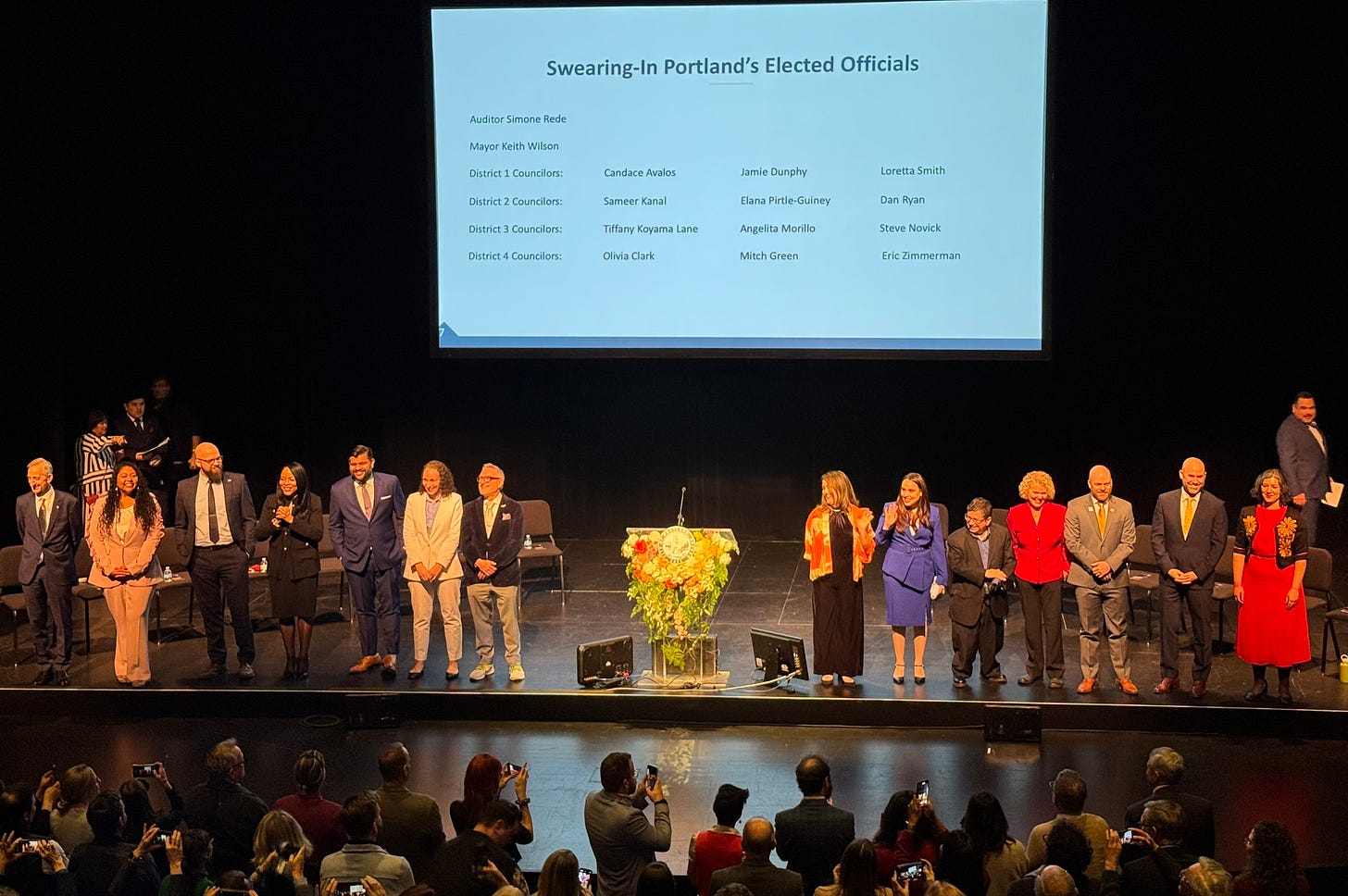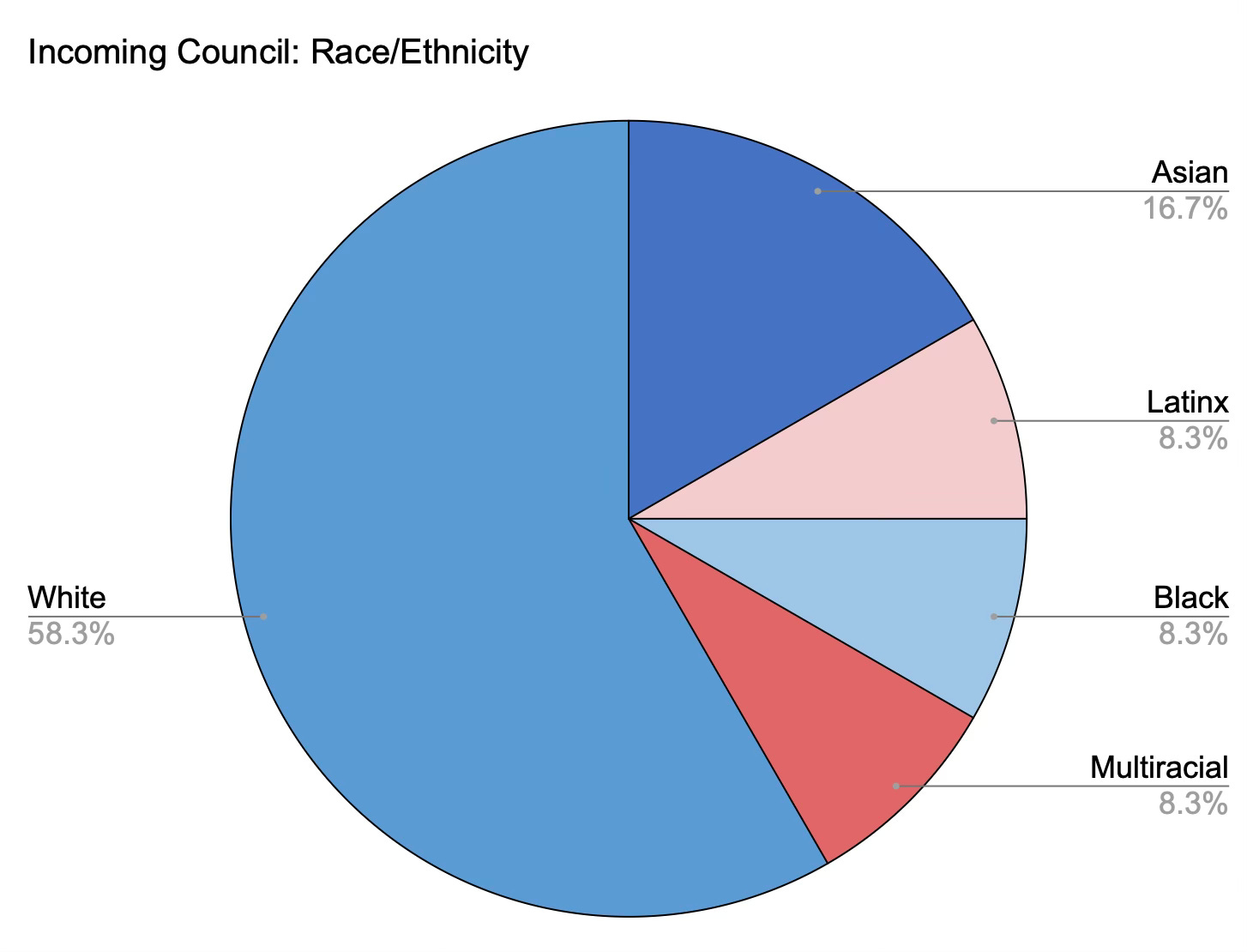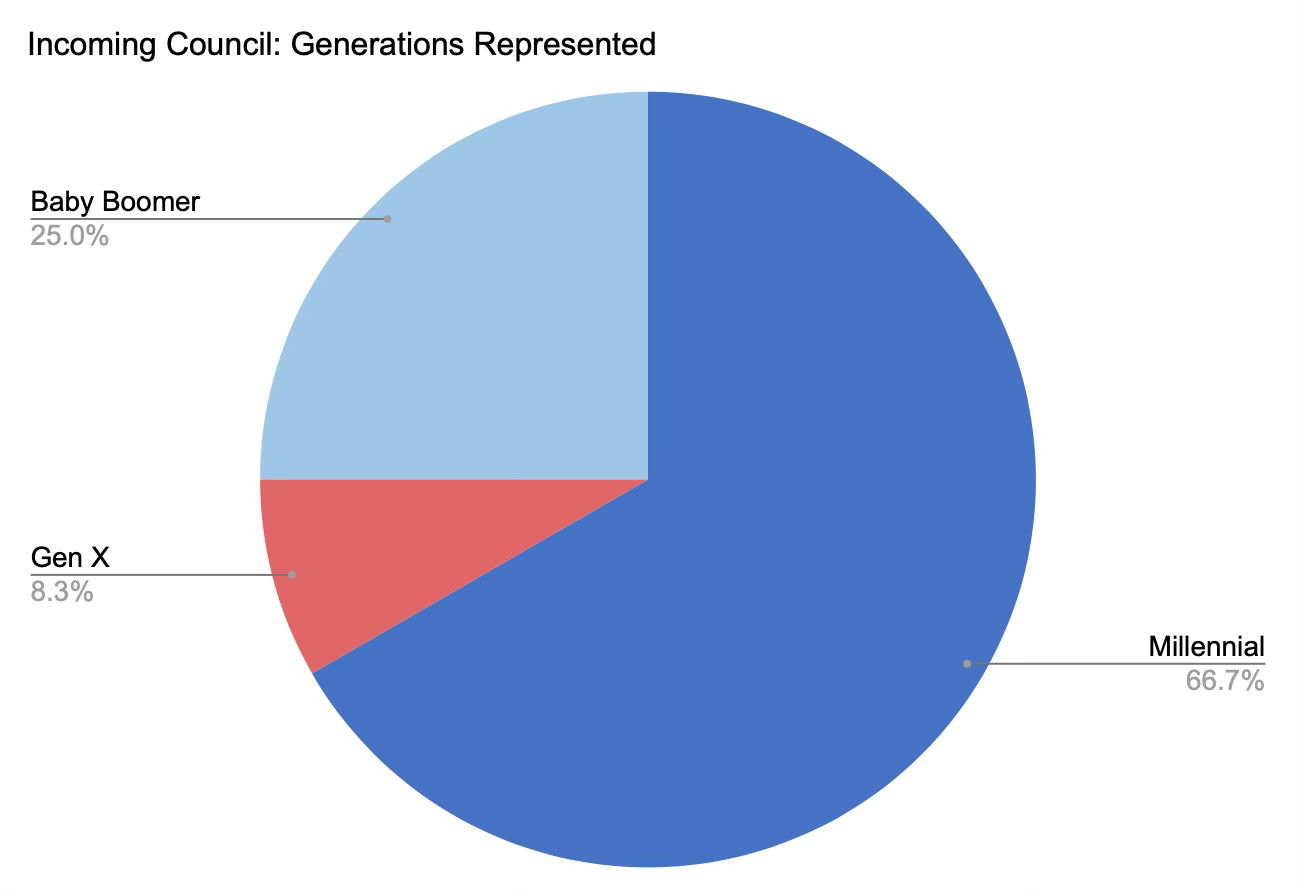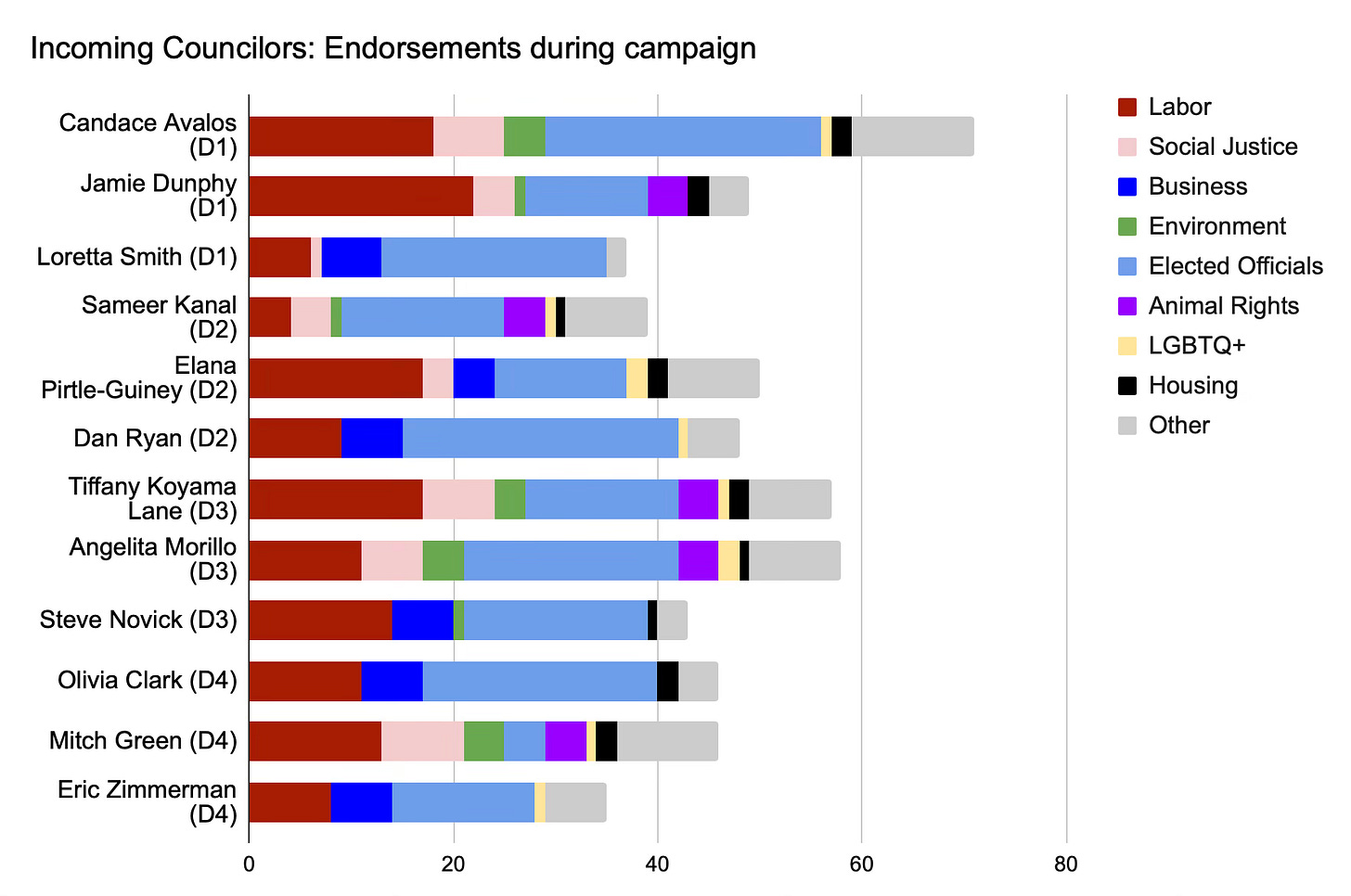A New Year, a New Chapter
Reform transformed Portland's campaign season—will it do the same for governance?
As an unprecedented election year draws to an end, we’re about to learn what governing looks like under Portland’s new system.
On December 19, the Newmark Theater in downtown Portland hosted a historic event: the swearing-in of Portland’s new government. Fourteen officials—Mayor Keith Wilson, Portland Auditor Simone Rede, and twelve city councilors—took the oath of office in a ceremony officiated by Oregon Court of Appeals Judge Darleen Ortega.
The ceremony featured many memorable moments, from Mayor Wheeler passing the torch to Wilson, to all twelve councilors raising their hands and reciting the oath in unison. For the audience, watching the new government together for the first time was also a showcase of their remarkable diversity.
In Rose City Reform’s new research report, Portland Decides, we show that while the record-breaking 2024 candidate pool was diverse, the council itself contains even greater representation for groups historically underrepresented at City Hall.
Six of the twelve councilors (50%) are women, compared to 27% of candidates.
Five councilors (42%) are Black, Indigenous, or People of Color (BIPOC), compared to 31% of the candidate pool.
Sameer Kanal and Tiffany Koyama Lane were elected as Portland’s first-ever Asian American council members, holding 17% of seats, despite Asian-identifying candidates representing just 4% of the field.
Four councilors (33%) openly identify as members of the LGBTQ+ community, compared to 19% of candidates.
Eight councilors (67%) are Millennials, a generation that made up 36% of the candidate pool. No member of the Millennial generation has served on the council until now.
What Coalitions Will Emerge?
The incoming government’s diversity extends beyond demographics. Our new city leaders enter office with a range of priorities and viewpoints. While no formal coalitions emerged during the election cycle, groups of incoming councilors appear aligned around several key issues:
Most of the incoming councilors are on the record as opposing the outgoing council’s policy of arresting unhoused individuals who refuse shelter. A minority—Olivia Clark, Steve Novick, Dan Ryan, Loretta Smith, and Eric Zimmerman—support the practice as a last resort. This division could soon prove significant, as Mayor Wilson’s campaign promise to end unsheltered homelessness relies, in part, on such enforcement to move those sleeping outside into emergency shelters. Hear Wilson outline his plan on the Stump Talk podcast.
Five incoming councilors—Candace Avalos, Mitch Green, Sameer Kanal, Tiffany Koyama Lane, and Angelita Morillo—have signed the Save Portland Street Response Pledge, vowing to fully fund the city’s unarmed crisis response program for mental health emergencies. This pledge requires them to take action within two months of assuming office to secure staffing and resources for the program and establish it as a co-equal part of Portland’s emergency response system. While not all incoming councilors signed the pledge, most support the program, which launched in 2021 with partial one-time funding from the American Rescue Plan Act.
Most incoming councilors take office with backing from influential labor organizations. The Northwest Labor Council, a regional federation, endorsed eight of the 12 council members. The labor union SEIU, representing healthcare and public service workers, supported seven councilors, with its affiliate, SEIU Local 49, also backing Mayor Wilson. Likewise, AFSCME Local 189, representing many City of Portland workers, endorsed seven councilors. These alliances could influence future budget decisions, including city employee benefits and infrastructure projects like the Keller Auditorium renovation and a new performing arts facility at Portland State University.
Three councilors—Green, Kanal, and Koyama Lane—are members of the Democratic Socialists of America (DSA). All three have signed the organization’s pledge to champion a Renters’ Bill of Rights, which among other things would tie rent to the minimum wage and mandate relocation assistance for rent increases above 5%. Two other councilors, who are not DSA members, Jamie Dunphy and Angelita Morillo, have also signed the pledge. Further, District 4’s Mitch Green has indicated that he will introduce a proposal to establish government-owned affordable rental housing in Portland, commonly referred to as “social housing".
Governing Is a Balancing Act
Exactly how Portland’s new council will organize remains an open question. Only time will tell whether members will form smaller, issue-specific coalitions or—to borrow a phrase from presidential biographer Doris Kearns Goodwin—emerge as a “team of rivals,” setting aside personal disagreements to pursue a unified purpose, such as passing Mayor Wilson’s shelter plan. Either way, the end of the year marks the pivotal moment when reformers turn into the new establishment, and when the status quo that many candidates campaigned against becomes their responsibility—and ultimately the benchmark for their success.
Before administering the oath of office, Justice Ortega reflected on the complexities of governing. “A truly diverse leadership space complicates governing,” she observed. “That’s a good thing because if we are making space for a variety of perspectives, it is more likely that our decisions will take into account more of what is true rather than what satisfies the few with the most power and influence.”
The swearing-in ceremony itself illustrated the delicate balance of civic leadership. While many councilors spoke passionately about a more inclusive public process, the event—a milestone in our city’s history—was closed to the public. Due to safety concerns, reporters received details about the location the morning of the event, a sober reminder of the tension between accessibility and security in today’s fraught political climate.
Just like the 2024 election cycle, the new government’s first term is sure to bring elements of joy, innovation, surprise, and frustration. That’s the challenge—and the promise—of a new chapter.
Now we get to write it together.
What’s Next for Rose City Reform
In 2024, Rose City Reform expanded with a searchable candidate tracker, the Stump Talk podcast, a daily election blog, and two in-depth research reports: State of the Race and Portland Decides.
In 2025, we’ll continue publishing the newsletter and the podcast, offering commentary, analysis, and perspectives to complement traditional media. We’ll also share the findings of multiple research projects with you along the way.
To everyone who read, subscribed, commented, or reached out with thoughts and suggestions in 2024—thank you. Happy New Year, and see you in 2025!







